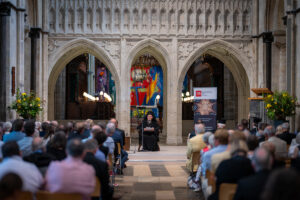The Hellenic History Foundation’s 2011 documentary film, “The Silent School”, will be screened at 6:00 p.m. on Friday, September 23, at the FedEx Global Education Center on the University of North Carolina at Chapel Hill campus. Previously screened in Istanbul, Turkey in February and Athens, Greece in April, the documentary tells the story of the Greek Orthodox Halki School of Theology, dormant since 1971 when it did not fit into then Turkish government’s education policy.
Immediately following the 48 minute documentary screening, Chaplain Abdullah Antepli, from the Duke University Center for Muslim Life, will share his perspective, as a Turkish Muslim Imam, on why the school should be reopened and what are the best ways for the Orthodox community to engage the conversation with the Turkish government: “I hope and pray that Turkey and Turkish Muslims will clean up this dirty and embarrassing spot in their civic history by opening this seminary as soon as possible,” said Imam Antepli, “
“The Silent School’s” 2011 release celebrates the 50th anniversary of His All Holiness, Ecumenical Patriarch Bartholomew’s graduation from the Halki School and marks four decades of the historic school’s silence. “After 40 years wandering in the wilderness of dormancy, it is time for the Halki legacy to finally reach the promised land,” said Duke Orthodox Christian Student Association (DOCSA) President, Nick Valilis. “Moreover, every university in America that does not have a dedicated Orthodox Student Center is also a “silent school” for the Orthodox minority in attendance,” Valilis said. “The Turkish Americans I have met understand this reality better than most Greek Americans.”
With endowment funded professorships and a doctoral training program in Islamic Chaplaincy at Hartford Seminary, where Duke’s Turkish Imam received his doctoral training and institutional chaplaincy certification, the Turkish American community has set the bar for religious minority groups interested in pursuing a greater presence on American University campuses. Inspired by the success of this model, DOCSA is working to create a doctoral training program in Orthodox chaplaincy under the banner of Duke Divinity School and stoke the conversation surrounding a vision for the possibility of an institutional partnership between the Halki School and a Patriarchal Institute for Orthodox Pastoral Healthcare at Duke Divinity.
“Any formal action is hierarchical domain,” Valilis said, “but some ideas must gain enough traction to become real possibilities before warranting serious hierarchical consideration. This event provides the forum for an exploratory conversation for brainstorming possibilities. For example, if His Eminence, Metropolitan Lambrinidis, hypothetically speaking, presided over both the Halki School and a Patriarchal Institute at Duke Divinity through a joint appointment, then perhaps the Patriarchate could operate Halki through the auspices of Duke Divinity, potentially removing the short-term technical dilemma of how Halki fits into the current Turkish education system. Duke Divinity School has extensive experience with global partnerships.”
“Here in America, this arrangement could attract more students to Orthodox seminaries whose degrees would be prerequisites for the doctoral program at Duke Divinity. For students thirsting for the unparalleled legacy of Orthodox phronema at Halki, the possibility of receiving Duke credits could facilitate matriculation at Halki and encourage international enrollment and exchange. Such an arrangement would also provide an organic connection between un-silencing Halki and giving voice to the Orthodox minority at other institutions of higher learning throughout the Diaspora, just as our Turkish brothers and sisters are courageously giving voice to their minority presence on American college campuses.”
Turkish investment in American university infrastructure is evident at Duke University and nearby UNC Chapel Hill where the symposium is to be held. In 2008, Duke University hired America’s first full-time Turkish Muslim University Chaplain and opened the nation’s first Islamic campus ministry center. The first Turkish student house in the US was opened at UNC that same year. Symposium attendees are invited for a tour and hospitality at the UNC Turkish house after the event. Tours of the Duke Center for Muslim Life will also be available by appointment on Saturday.
The documentary screening and symposium is co-sponsored by the Duke Orthodox Christian Student Association (DOCSA), the Duke Center for Muslim Life, and the Carolina Center for the Study of the Middle East and Muslim Civilizations. Doors open at 5:30; light refreshments will be served in the atrium. The event is free and open to the public. Out of state attendees are encouraged to reserve a seat in advance by emailing dukehalki@gmail.com.
For additional information, please contact:
Duke Orthodox Christian Student Association
dukehalki@gmail.com
Nick Valilis 915.241.5099







